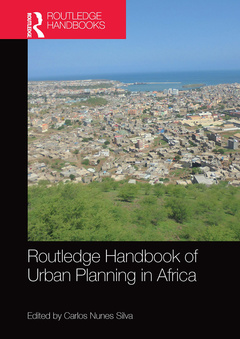Routledge Handbook of Urban Planning in Africa
Coordonnateur : Silva Carlos Nunes

This handbook contributes with new evidence and new insights to the on-going debate on the de-colonization of knowledge on urban planning in Africa.
African cities grew rapidly since the mid-20th century, in part due to rising rural migration and rapid internal demographic growth that followed the independence in most African countries. This rapid urbanization is commonly seen as a primary cause of the current urban management challenges with which African cities are confronted. This importance given to rapid urbanization prevented the due consideration of other dimensions of the current urban problems, challenges and changes in African cities. The contributions to this handbook explore these other dimensions, looking in particular to the nature and capacity of local self-government and to the role of urban governance and urban planning in the poor urban conditions found in most African cities. It deals with current and contemporary urban challenges and urban policy responses, but also offers an historical overview of local governance and urban policies during the colonial period in the late 19th and 20th centuries, offering ample evidence of common features, and divergent features as well, on a number of facets, from intra-urban racial segregation solutions to the relationships between the colonial power and the natives, to the assimilation policy, as practiced by the French and Portuguese and the Indirect Rule put in place by Britain in some or in part of its colonies.
Using innovative approaches to the challenges confronting the governance of African cities, this handbook is an essential read for students and scholars of Urban Africa, urban planning in Africa and African Development.
1. Ancient, Colonial and Post-Colonial Urban Planning in Africa - An Introduction Part 1: Colonial Urban Planning and Pre-Colonial Urban Heritage in Africa 2. The Birth of a Town. Indigenous Planning and Colonial Intervention in Bolgatanga, Northern Territories of the Gold Coast 3. History of the Urban Planning of the City of Zinder in the Niger Republic 4. Mise En Valeur and Repopulation in Colonial Rural Development in French Morocco 5. Infrastructure and Urban Planning: The Port and City of Algiers under French Colonial Rule, 19th - 20th Century 6. Living in Lourenco Marques in the Early 20th Century: Urban Planning, Development and Well-Being 7. Colonizing and Infra-Structureing the Angolan Territory Through Colonist Settlements: The Case of the Cela Settlement 8. Diamang's Urban Project - Between the Peace of Versailles and the Colonial Act Part 2: Post-Colonial Urban Planning in Africa 9. Local Governance and Urban Planning: Centralization, De-Concentration and Decentralization in Africa 10. The Resilience, Adaptability and Transformation of the South African Planning Profession 11. Setting Standards and Competencies for Planners 12. African Design and Ciam Expansion after the Charter of Athens 13. To Survey, Control and Design: Doxiadis and Fathy on Africa's Future and Identity, 1959-63 14. New Towns in Algeria: Planned Process to Control the Accelerated Urbanization, Case of Sidi Abdellah and Ali Mendjeli 15. Emergent Urbanism in Angola and Mozambique: Management of the Unknown 16. The Africanisation of Public Space in South Africa: A Moment of Opportunity 17. Missed the Stop? Incremental Upgrading or Waiting For Housing in Buffalo City 18. Framing Power in Co-Production Engagements in Kampala City, Uganda 19. Power-Shifts in the Organisational Landscapes of Transport Provision - The Introduction of BRT in Nairobi and Dar Es Salaam 20. Informality, Urban Transport Infrastructure, and the Lessons of History in Accra, Ghana 21. Moroccan Towns - Nourishing Urban Spaces? 22. Planning for less Planning: Supporting Informal Food Systems in Nairobi
Carlos Nunes Silva, Geographer, PhD, is Professor Auxiliar at the Institute of Geography and Spatial Planning, University of Lisbon, Portugal. He is the Chair of the IGU Commission on ‘Geography of Governance’ and the founding editor-in-chief of the ‘International Journal of E-Planning Research’.
Date de parution : 06-2021
17.4x24.6 cm
Date de parution : 11-2019
17.4x24.6 cm
Thème de Routledge Handbook of Urban Planning in Africa :
Mots-clés :
Young Men; Planning Profession Act; african development; Colonial Administration; urbanisation africa; Development Facilitation Act; planning africa; Informal Settlement Upgrading; urban planning africa; Habitat Iii; urban africa; BRT System; local governance; BRT Corridor; urban policy responses; Spatial Planning Systems; Africa urban planning; Buffalo City; de-colonization; BRT Project; Urban Agriculture; Le Corbusier; BRT; Informal Settlements; South African Cities; Urban Hunger; Planning Profession; Spatial Planning; Public Private Partnership; Urban Food Security; Central Government; Informal Food Sector; Adaptive Cycle Model; Lusophone African Countries



